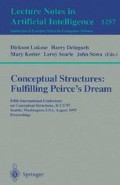Abstract
Our study registers in the framework of the automatic construction of classifications. We tackle an issue which has been less explored, that of the discovery of classifications. To tackle this problem we have chosen to pursue and develop the works of Mineau in the domain of the organization of knowledge bases using generalization [20]. We propose an original approach, called COING, to the discovery of classifications of structured objects represented using conceptual graphs. This approach consists in building a space of concepts which generalize the objects descriptions, called the Generalization Space, and then exploring this space so as to iteratively extract one or several conceptual classifications [2]. In this paper, we describe the method of construction of the Generalization Space that has been implemented in COING. This method is an extension of the MSG proposed by Mineau [19], which enables to account for knowledge about the types during the construction of the Generalization Space. However, we propose a formaliuzation of the use of constraints in the construction of the Generalization Space. We present empirical results of the method proposed that show its effiency.
Preview
Unable to display preview. Download preview PDF.
References
G. Bisson. Learning in fol with a similarity measure. In Proc. of AAAI, pages 82–87, San Jose, CA, 1992.
I. Bournaud. Regroupement conceptuel pour l'organisation de connaissances. Thèse de Doctorat, Université Paris VI, France, 1996.
I. Bournaud and J.G. Ganascia. Conceptual clustering of complex objects: A generalization space based approach. In Lectures Notes in AI n-954. Proc. of the third International Conference on Conceptual Structures, pages 173–187. Springer-Verlag, 1995.
C. Carpineto and G. Romano. GALOIS: An order-theoretic approach to conceptual clustering. In Proceedings of the Tenth International Conference on Machine Learning, pages 33–40, 1993.
M. Chein and M. L. Mugnier. Conceptual graphs: Fundamental notions. In Revue d'intelligence artificielle 6(4), pages 365–406. 1992.
G. Ellis. Efficient retrieval from hierarchies of objects using lattice operations. In Lecture Notes in AI n-699. Proc. First International Conference on Conceptual Structures, pages 274–293. 1993.
D. Fisher. Knowledge acquisition via incremental conceptual clustering. In Machine Learning 2, pages 139–172. 1987.
D. Fisher. Iterative optimization and simplification of hierarchical clusterings. In Journal of Artificial Intelligence Research, Vol. 4, pages 147–179. 1996.
J.G. Ganascia. Agape et Charade, deux techniques d'apprentissage symbolique appliquées à la construction de bases de connaissances — Doctorat d'Etat. Thèse d'Etat, Université de Paris XI-Orsay, France, 1987.
J.H. Gennari, P. Langley, and D. Fisher. Models of incremental concept formation. In Artificial Intelligence 40–1(3), pages 11–61. 1989.
R. Godin, G. Mineau, R. Missaoui, and H. Mili. Méthodes de classification conceptuelle basées sur les treillis de galois et applications. In Revue d'Intelligence Artificielle, 9(2), pages 105–137. 1995.
O. Guinaldo. Techniques d'indexation pour aider à la classification dans le modèle des graphes conceptuels. In Actes de la conférence Langages et Modèles á Objets, LMO'95, Nancy, France, 1995.
D. Haussler. Learning conjunctive concepts in structural domains. In Machine Learning 4, pages 7–40. 1989.
J. U. Kietz and S. Wrobel. Controlling the complexity of learning in logic through syntactic and task-oriented models. In S. Muggleton, editor, Inductive Logic Programming, pages 335–359. Academic Press, 1992.
Y. Kodratoff and J. G. Ganascia. Improving the generalization step in learning. In J.G. Carbonell and T.M. Mitchell, editors, Machine Learning: an Artificial Intelligence Approach, pages 215–244. San Mateo, CA: Morgan Kaufmann, 1986.
R. Levinson. Uds: A universal data structure. In Lectures Notes in AI n-835, Proc. Second International Conference on Conceptual Structures, ICCS'94, pages 230–250. 1994.
R.S. Michalski. A theory and methodology of inductive learning. In Machine Learning, An Artificial Intelligence Approach, Volume I, pages 83–129. Morgan Kaufmann, 1983.
R.S. Michalski and R.E. Stepp. An application of ai techniques to structuring objects into an optimal conceptual hierarchy. In Proceedings of the Seventh International Joint Conference on Artificial Intelligence, pages 460–465, 1981.
G. Mineau, J. Gecsei, and R. Godin. Structuring knowledge bases using automatic learning. In Proc. Sixth International Conference on Data Engineering, pages 274–280, Los Angeles, USA, 1990.
G. Mineau, R. Godin, and J. Gecsei. La classification symbolique: une approche non subjective. In Actes des Journées Françaises d'Apprentissage, Lannion, France, Avril 1990.
S. Muggleton and C. Feng. Efficient induction of logic programs. In S. Muggleton, editor, Inductive Logic Programming, pages 281–298. Academic Press, 1992.
M. Pazzani and D. Kibler. The utility of knowledge in inductive logic. In Machine Learning (9), pages 57–94. 1992.
R. Quinlan. Learning logical definitions from relations. In Machine Learning (5), pages 239–266. 1990.
J. D. Roberts. A new parallelization of subgraph isomorphism refinement for classification and retrieval of conceptual structures. In Lectures Notes in AI n-954. Proc. of the third International Conference on Conceptual Structures, pages 202–216. Springer-Verlag, 1995.
B. Tausend. Representing biases for inductive logic programming. In Lecture Notes in Artificial Intelligence 784 F. Bergadano and L. De Raedt, editors, Proc. of the European Conference on Machine Learning, ECML-94, pages 427–430, 1994.
K. Thompson and P. Langley. Concept formation in structured domains. In Concept Formation: Knowledge and Experience in Unsupervised Learning. Morgan Kaufmann, San-Mateo, California, 1991.
J.D. Zucker and J.G. Ganascia. Changes of representation for efficient learning in structural domains. In Proc. International Conference on Machine Learning, Bari, Italy, 1996.
Author information
Authors and Affiliations
Editor information
Rights and permissions
Copyright information
© 1997 Springer-Verlag Berlin Heidelberg
About this paper
Cite this paper
Bournaud, I., Ganascia, JG. (1997). Accounting for domain knowledge in the construction of a generalization space. In: Lukose, D., Delugach, H., Keeler, M., Searle, L., Sowa, J. (eds) Conceptual Structures: Fulfilling Peirce's Dream. ICCS 1997. Lecture Notes in Computer Science, vol 1257. Springer, Berlin, Heidelberg. https://doi.org/10.1007/BFb0027890
Download citation
DOI: https://doi.org/10.1007/BFb0027890
Published:
Publisher Name: Springer, Berlin, Heidelberg
Print ISBN: 978-3-540-63308-2
Online ISBN: 978-3-540-69424-3
eBook Packages: Springer Book Archive

